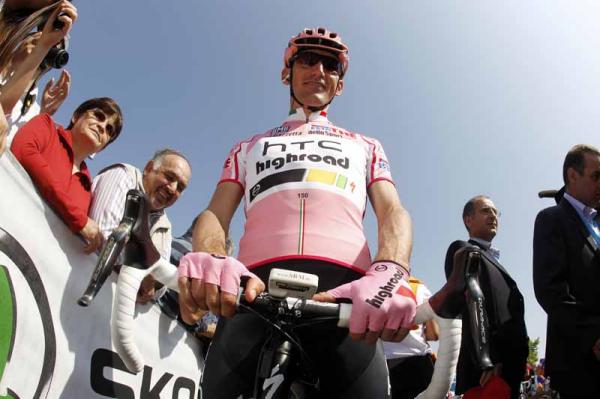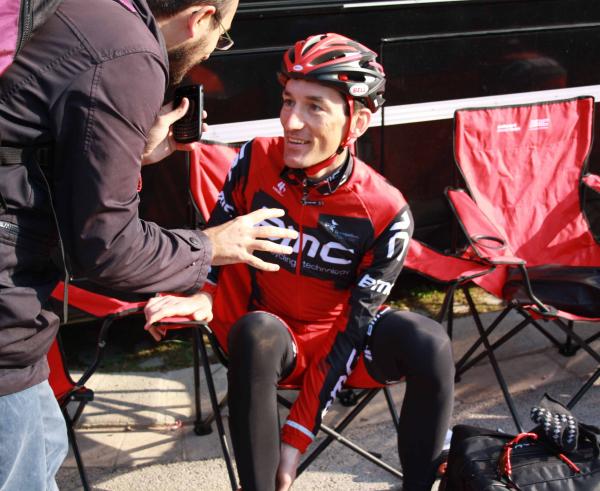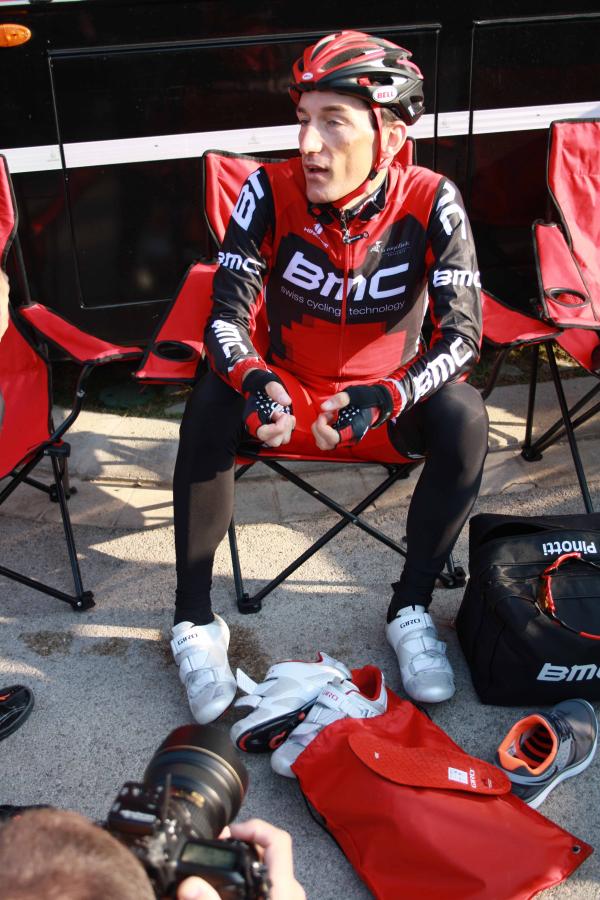Pinotti says Tour de France not essential preparation for 2012 London Olympics
BMC rider discusses Giro and his standing in Italy



The Olympic Games time trial is perhaps the centrepiece of Marco Pinotti’s 2012 season, and the Italian is confident that he can arrive in London on top form, regardless of whether or not he rides the Tour de France for his new team BMC.
Pinotti told Cyclingnews that he has taken solace from his performance at the world championships time trial last year, when he lined up in Copenhagen with just six weeks of training in his legs due to a fractured hip sustained in May’s Giro d’Italia.
“I was emotional afterwards because I didn’t think that I’d succeed in not finishing last at the Worlds with just six weeks of training,” Pinotti said, smiling. “It’s given me a lot of encouragement for this year. I wasn’t at 100 percent, and it made me realise that with the Tour or without it, I could prepare well for the Olympic time trial.”
While received wisdom suggests that a three-week stage race is the ideal way to build form for the world championships or Olympics, Pinotti argues that it is not necessarily de rigeur for time triallists. While Pinotti will lead BMC at the Giro d’Italia, he is not currently pencilled in to line up alongside Cadel Evans in France. As far as Olympic preparation goes, he recognises that riding the Tour in July presents far more variables than preparing diligently at home.
“If the team asks me to go, I’ll do it gladly, but in any case, with the Tour or without, I can prepare for the Olympics,” he said. “When you go to ride the Tour, it’s like being a passenger on a ship. What happens, happens, and you can’t manage it directly. It could be a good trip and you might come out of it well, or it could be turbulent.
“If you prepare by doing the Tour of Poland and by training at home, that could be a good approach. There are two possibilities, and both are good.”
A cursory glance at the podium in Beijing four years ago suggests that not riding the Tour may in fact offer a more suitable approach to the Olympic time trial. “Apart from [gold medallist Fabian] Cancellara, they hadn’t done the Tour before the Olympics,” Pinotti said. “Gustav Larsson did the Tour of Denmark and Levi Leipheimer did a race in the States.”
The latest race content, interviews, features, reviews and expert buying guides, direct to your inbox!
The Italian question
Pinotti must still earn his selection for the Italian team, however, and after missing out to Vincenzo Nibali in 2008 while he was national time trial champion, he is quietly aware that nothing can be taken for granted. Indeed, for all his success with HTC-Highroad, there is a palpable sense that Pinotti is more widely appreciated north of the Alps than he is in his own country.
“Perhaps it’s because I’ve spent the last four or five years on foreign teams, and the media doesn’t pay the same attention to them,” Pinotti admitted. “I am undervalued, because last year I was the fourth Italian rider on the WorldTour standings after riding only three and half months of the season, and in the last three years, I’ve always finished among the top five Italians in the WorldTour rankings.
“It doesn’t help that I’m not a fast rider, so I don’t have a big return of wins, but I think I’m one of the most consistent riders in stage races, long and short. Plus I’m almost the only Italian who can compete respectably in the time trial at international level.”
Pinotti has been a consistent performer at the Giro d’Italia in recent seasons, even in the face of increasingly mountainous routes. The Bergamo native welcomed the more measured 2012 Giro course, even if the relative lack of time trial miles remains a frustration.
“For the last few years, I’ve always been hoping for a more balanced Giro d’Italia – not easier, but more balanced,” he said. “This year it’s getting there, although they’re missing a long time trial…”
Once again, Pinotti lines up with the intention of finishing in the top ten overall, even if bettering 2010’s 9th place finish “is certainly not an obsession.”
“I know that it must just happen that I come across riders who are stronger than me, as happened in 2008,” he said. “But in 2009 and 2010, I was always in the top 15 on the climbs, and this year the route is more balanced. There are long stages near the end, which might mean that riders with good endurance and experience can go well.”
By the time May comes around, Pinotti also hopes to be finally back in peak condition following his crash at last year’s Giro. After fast-tracking his rehabilitation last summer so as to make the start line in Copenhagen, Pinotti had time to continue his work in the off-season once surgery on a separate back injury was out of the way in October.
“I’ve read some studies that say for every month you’re out, you need three to recover. So for me, it’s going to take nine months to get over it fully,” he said. “Given that I really started back in October, by next May and June, the recovery process will be completely over.”

Barry Ryan was Head of Features at Cyclingnews. He has covered professional cycling since 2010, reporting from the Tour de France, Giro d’Italia and events from Argentina to Japan. His writing has appeared in The Independent, Procycling and Cycling Plus. He is the author of The Ascent: Sean Kelly, Stephen Roche and the Rise of Irish Cycling’s Golden Generation, published by Gill Books.